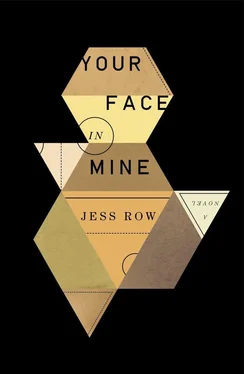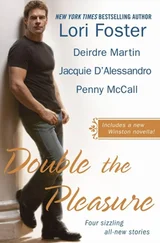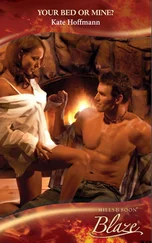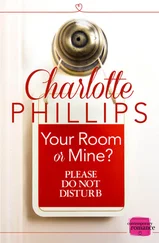I park on Duke of Gloucester Street, just south of the statehouse, planning to walk downhill to the harbor market for lunch, but when I get out of the car I feel that same unmistakable lurching sensation, my clothes chafing, my shoulders about to give way, as if I’ve carried two bags of bowling balls up a long flight of stairs. The gray hour. I associate it with a satchel full of unread journals and the taste of the cheap jasmine tea I carried with me everywhere in a jar. On the next block there is a sign for a bookstore-café, the Wickett Arms, with hand-chiseled letters on what appears to be a blackened shield. I cross through the front space, an ordinary-looking room, and enter the café through an open grate in the rear. It’s a brick vault, a former prison, with chains dangling from the walls between the fair-trade posters and framed burlap sacks from Costa Rica and Ethiopia. From the teenage girl at the counter I order a double red-eye — having never been able to stand the syrupy texture of straight espresso — and wait for it in front of the pastry case, not trusting myself to sit down and get back up again. Then, waiting for it to cool, still wary of a comfortable chair, I wander back through the shelves, looking for the African American section, and take down a copy of The Souls of Black Folk .
I read Du Bois in high school, in AP American history, and then later on in a class at Amherst called “The Concept of an American Minority.” I’m remembering, now, something very particular: his description of his newborn son, who lived only a few days.
How beautiful he was, with his olive-tinted flesh and dark gold ringlets, his eyes of mingled blue and brown, his perfect little limbs, and the soft voluptuous roll which the blood of Africa had molded into his features! I held him in my arms, after we had sped far away to our Southern home — held him, and glanced at the hot red soil of Georgia and the breathless city of a hundred hills, and felt a vague unrest. Why was his hair tinted with gold? An evil omen was golden hair in my life. Why had not the brown of his eyes crushed out and killed the blue?
No more evil omens, no more vague unrest.
The body you want, not the body you have.
I could write a brochure.
Fuck, I think. I am writing his brochure.
On the same note, who would I want to be? How far does it extend? Could I be, for example, Takeshi Kitano? I’ve always loved Takeshi Kitano. Something about the weariness in his eyes, and his utterly still face. Or, simply, better looking. Given the chance, I might choose to be handsomer. Better bone structure. A slightly larger penis. From what point do I begin to empathize with Martin? Or does this stretch and distort the very idea of empathy, the powers of the imagination? I have no idea what it would be like to want to be a woman. In my life I’ve known two transsexuals: Donald Hathaway, who was two years below me at Amherst, and who became Dani my senior year, and Trish Holland, at WBUR, who called herself a boydyke, wore three-piece suits, and resembled a thinner Leonardo DiCaprio with dark hair. In neither case did I ever feel I had to understand them. There is a point where analogies end. Acceptance has to precede analogy. Acceptance is not equivalence.
Acceptance is not enough.
I sip the coffee, now in its proper state, just short of scalding, and with a rush of tingling energy, take out my pen and notebook — a reporter’s notebook, which I bought weeks ago and haven’t used at all, except to note the dates and lengths of our interviews — and write out a line from the Tao Te Ching :










Know the white,
Stay with the black,
This is the pattern of Heaven.
—
When I was first learning Chinese in college, enraptured by each new character, I used to write famous quotations on little slips of paper and carry them around in my pockets, like fortune-cookie fortunes. At parties, after the third or fourth beer, I would distribute them to friends — girls, especially — making up meanings as I went along. It was one last failed attempt to cultivate an aura of eccentric cool. Later, however, in China, my ability to quote famous proverbs from memory made me a minor celebrity. In restaurants, at official banquets, people would crowd around my table to listen to the laowai who could recite Confucius and Zhu Xi. Wendy hated it. They’re treating you like a monkey, she said. You’re supposed to meditate on these things, not broadcast them like songs on the radio.
But, I persisted once, what if I find them relevant to the situation?
They’re never relevant to the situation. They’re timeless . It’s different. You’re distorting them. You think you’re becoming Chinese, and you’re not. You’re becoming a parrot.
What would she think of all this? I won’t ask myself this question, I’ve decided. Why should she, in particular, be my tribunal on matters of race? She hated to talk about it. Generalizations of any kind drove her to tears. Once, in a squabble over the remote, I forced her to watch ten minutes of Chappelle’s Show , some inane skit about white men wearing grass skirts and Latinos playing bongo drums, and she went into the bathroom and vomited. No one I’ve ever met took the ideal of a colorblind society more literally. In one of her college essays — one I edited, though she hardly needed it — she wrote, the idea of e pluribus unum means that all labels are deceptive. We could even say they are lies. Skin color, religion, and nationality are all beside the point, which is that human beings are individuals.
She would never have forgiven me, I think, for taking up Martin’s cause. If that’s what I’ve done. Any more than she would forgive me, even for a moment, for wishing I was somehow other than who I am, that I had been born in Wudeng. She would never find it funny that I would call up a passage from the Tao Te Ching and pretend it matters. Even if I don’t think I’m pretending. Isn’t the most basic lesson of Taoism, I would have said, that we should see things from every side? The yin-yang. Complementary forces. Strength flows into weakness, and vice versa. What are ideas of race but complementary forces, constructions that depend on each other? What Chappelle is doing, I told her that night, is just playing with stereotypes. Not embracing them. He’s making them ridiculous. He’s signifying. I got up to pull a Henry Louis Gates book down from the shelf, and she leaped up behind me and ran to the bathroom. When she returned, patting her blotchy face with a damp washcloth, she said, you can play. You can tell me it’s okay. Because you’re already here. And then she went to bed.
Читать дальше






















